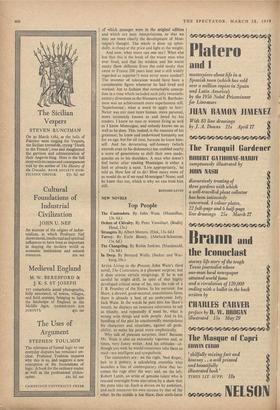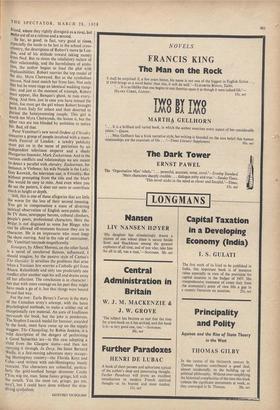NEW NOVELS
Top People
Orders of Chivalry. By Peter Vansittart. (Bodley Head, 15s.) AFTER Living in the Present, John Wain's third novel, The Contenders, is a pleasant surprise; but it does arouse certain misgivings. If he is not careful he might drift, in spite of that highly developed critical sense of his, into the role of a J. B. Priestley of the Sixties. In his narrator, Joe Shaw, a shrewd, good-natured, unambitious fatso, there is already a hint of an embryonic Jolly Jack•Wain. In the words he puts into Joe Shaw's mouth, he displays no insincere reluctance to tell us bluntly, and repeatedly if need be, what is wrong with things and with people. And in his handling of the plot he unashamedly manipulates his characters and situations, against all prob- ability, to make his point more emphatically.
Why talk of pleasant surprises, then? Because Mr. Wain is also an extremely vigorous and, at times, very funny writer. And his attitudes—al- though you wish he would sometimes take them as read—are intelligent and sympathetic.
The contenders are: on the right, Ned Roper, heir to a pottery, a calculating smoothie who launches a line of contemporary china that be- comes the rage after the war; and, on the left, Robert Lamb, an artist of genuine talent who is rescued overnight from starvation by a show that the press take up. Each is driven on by ambition, and each measures his.own success by that of the other. In the middle is Joe Shaw, their sixth-form friend, whom they rightly disregard as a rival, but Make use of as a referee and a second.
So far, so good; in fact, very good at times, especially the tussle to be last in the school cross- Country, the description of Robert's move to Lon- don, and of his attitude toward taking money from Ned. But to stress the retaliatory nature of their relationship, and the harmfulness of ambi- tion, the author begins to load the plot with implausibilities. Robert marries the top model of the day, Myra Chetwynd. But as she symbolises success, Ned must snatch her from him. Not only that but he must stage an identical wedding recep- tion; and just at the moment of triumph, Robert must appear, like Banquo's ghost, to ruin every- thing. And then, just in case you have missed the point, Joe must get the girl whom Robert brought back from Italy for solace and then deserted to Pursue the honeymooning couple. This girl is Worth ten Myra Chetwynds, the lesson is, but the other two are too blinded by ambition to notice her. Bad, all that.
Peter Vansittart's new novel Orders of Chivalry concerns a group of people involved with a mam- moth Festival of London : a tawdry publicity stunt put on in the name of patriotism by an independent television emperor and a shady Hungarian financier, Mark Zuckerman. And in the various conflicts and relationships we are meant to detect a parallel with chivalry. Zuckerman, for instance, is Violence; his wife Natalie is the Lady; Guy Keswick, the television star, is Frivolity. But Without prompting from the title and the blurb this would be easy to miss. And even when you do see the pattern, it does not seem to contribute much in height or depth.
Still, this is one of those allegories that are little the worse for the loss of their second meaning. You get in compensation a mass of diverting satirical observation of English semi-public life : its TV dons, newspaper barons, cultural climbers, People's poets, professional characters. Here the Writer is not disguised as some Joe Bloggs who can be allowed off-moments because they are in character. He is an impresario who must keep the show moving. And in the role of entertainer, Mr. Vansittart succeeds magnificently.
Strangers, by Albert Memmi, on the other hand, is a novel of unrelieved flatness, influenced, I should imagine, by the passive style of C'amus's The Outsider•. It serialises the problems that arise when a Tunisian Jew marries a Catholic girl from Alsace. Relentlessly and only too predictably one conflict after another saps his will and drains away all her affection. The conclusion is in character : not that with more courage on his part they might have made a go of it, but that things were bound to end that way.
For the rest : Earle Birney's Turvey is the story of the Canadian army's attempt, with the latest Psychological methods, to make a soldier out of exceptionally raw material. An aura of kindliness surrounds the book, but the joke is ponderous. The Stephen Leacock medal for humour, awarded to the book, must have come up on the supply waggon. The Changeling, by Robin Jenkins, is a mild description of the dangers of performing a Good Samaritan act—in this case adopting a child from the Glasgow slums—and then not carrying it through. In Deep, the latest Bernard Wolfe, is a fast-moving adventure story occupy- ing Hemingway country—the Florida Keys and Cuba--and written with sub-Hemingway manly restraint. The characters are colourful, particu- larly the gold-toothed bongo drummer Coolie ('You wig me, man. Some funny gringo, kill with the mouth. You the most cat,. gringo, gas me, sure'), but I could have done without the skin- diving symbolism.
GEOFFREY NICHOLSON











































 Previous page
Previous page